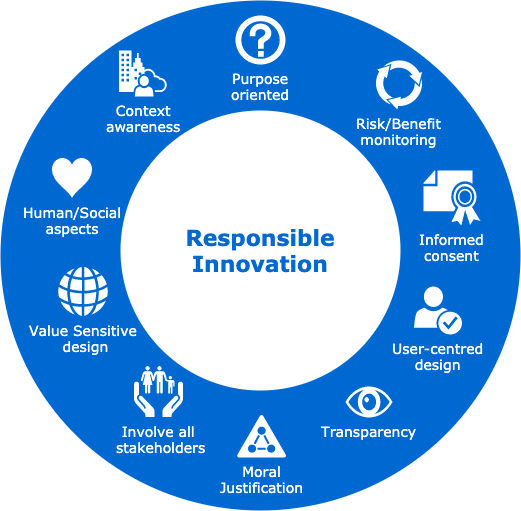Responsible Research and Innovation
The process of developing and deploying emerging technologies is clouted in uncertainty at technical, ethical, and societal levels. Understanding where are we now and possible scenarios these technologies can bring about is essential to shape their transition from proof-of-concept systems to adopted products.
Responsible Research and Innovation (RRI) can be a useful guideline to developers and entrepreneurs in emerging technologies. A first principle to consider is the moral justification and proportionality of the proposed solutions. Careful analysis of the known risks and benefits should guide decisions on development and deployment of technological solutions. Moreover, it is advised to take a proactive stance on the ELSI (Ethical, Legal and Social Implications) implications of these technologies. As the some of the risks of these technologies can only be discovered once they are deployed to their customers, developers should establish mechanisms for continuous monitoring and mitigation of the effects of their technologies. Importantly, consumers should consider these products and services as being in continuous development and that there are underlying risks both known and unknown. Consequently, legal frameworks should provide efficient mechanisms for user protection, as well as clearly define liability and accountability issues in the case unknown risks materialize.

I am engaged in several initiatives aimed at promoting a responsible research and innovation approaches for emerging technologies. First and foremost, I head the Swiss office of the European CLAIRE Initiative on human-centred Artificial Intelligence. I also work with IEEE Sandards Association by chairing the group on Neurotechnologies for Brain-Machine Interface. This group is aimed at identifying gaps and priorities for standardization in this field. I also contributed to to the OECD working paper on Responsible Innovation for Neurotechnology Enterprises released in Autumn 2019
Documents
-
Bontempi et al. The CLAIRE COVID-19 initiative: approach, experiences and recommendations, Ethics and Information Technology (2021)
-
Chavarriaga et al. Standardization of Neurotechnology for Brain-Machine Interfacing: State of the Art and Recommendations, IEEE Open Journal of Engineering in Medicine and Biology, Early Access
-
Standards Roadmap: Neurotechnologies for Brain-Machine Interfacing, IEEE Standards Association. February 2020
-
Responsible Innovation for Neurotechnology Enterprises, OECD working paper, Autumn 2019
-
On the Need of Standards for Brain-Machine Interface Systems, IEEE Brain eNewsletter, 2017
Recent Activities (Selection)
-
16 Nov 2022: IEEE Standards Association Webinar. AI Ethics: How can social responsibility be implemented in autonomous intelligent systems? Webinar. Invited Speaker
-
15 Nov 2022: Geneva Center for Security Policy (GCSP): Executive Course: Frontiers in the digital domain: the geopolitics of cybersecurity and artificial intelligence, Geneva, Switzerland. Invited Speaker
-
13 Oct 2022: Geneva Science and Diplomacy Anticipator (GESDA) Summit: Session Navigating the NeuroTech Compass, Geneva, Switzerland. Invited Speaker
-
11 Oct 2022: International Conference in preparation for the Ninth Review Conference of the UN Biological Weapons Convention: Neuroscience, Neurotechnology, and Biosecurity session - Talk Opportunities and risks of Neurotechnologies and Brain-Machine Interfacing, New Dehli, India. Invited Speaker
-
28 Sep 2022: Digitalisation: les challenges et opportunités pour les PME. Workshop Intelligence Artificial pour les PME, Fribourg, Switzerland. Invited Speaker
-
27 Sep 2022: Geneva Science and Diplomacy Anticipator (GESDA): Young global voices workshop: Future norms and principles of neurotechnology, Geneva, Switzerland. Invited Speaker
-
15 Aug 2022: Digital Breakfast - Digital Hub Winterthur: Responsible AI: From ethical principles to organizational processes, Winterthur, Switzerland, Invited Speaker
-
12 Aug 2022: UN Human Rights Council Advisory Committee: Assessing human rights implications of neurotechnologies: towards the recognition of neurorights, Geneva, Switzerland. Invited expert
-
15 Jun 2022: 50th anniversary Dalle Molle Foundation: Public Conference - Between Autonomy and Control: What is the future of Artificial Intelligence?, Geneva, Switzerland. Invited Panelist [Video]
-
21 May 2022: 30th anniversary: Haute Ecole de Gestion Fribourg: Colloquium Data-Driven Society, Fribourg, Switzerland. Invited Panelist.
-
18 May 2022: Geneva Science and Diplomacy Week: Preventing the Misuse of Emerging Technologies: What can be done and which governance system to put in place?, Geneva, Switzerland. Invited speaker
Sponsors and partners
 |  |
 | |
 |
 |
 |
 |
